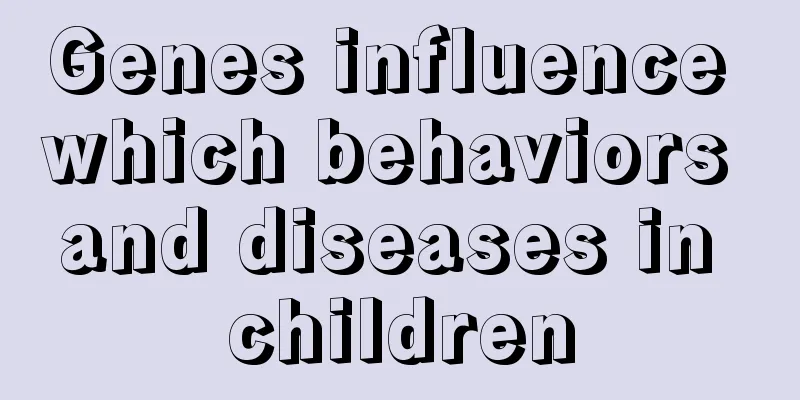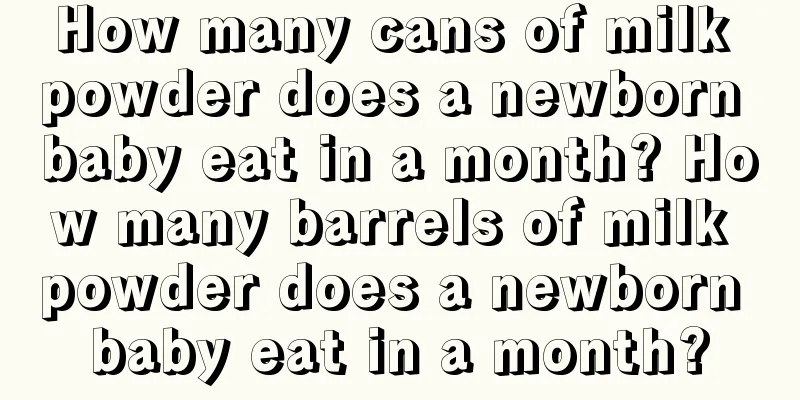How many months can babies eat pureed meat? At what age can babies start eating meat?

|
When to start adding complementary food to babies has always been a concern for many mothers! Many new mothers are confused about how many months babies can start adding meat paste to their diet? How many months can babies start eating meat paste? How old can babies start eating meat? The editor of No. 5 website will answer them one by one for you! How many months can babies eat meat pasteBabies can eat meat puree when they are 6 months old. Babies can start to add complementary foods from 4 months old. As the gastrointestinal function gradually improves, complementary foods are gradually added until the baby is about 1 year old. Then they can eat normally. The food should be slightly softer than adult food, with less oil and salt. New mothers need to pay attention: each time you add a food, you should give the baby a few bites and observe for 2 days. If there is no allergy, continue to add it. Generally, rice noodles, fruit puree, vegetable puree, juice and egg yolk are added from 4 months old. White fish puree, degreased broth, mashed noodles, etc. can be added around 6 months. Meat puree and liver puree can be added at 8 months. Egg white, that is, whole egg, shrimp, and fish can be added at 10 months. White fish refers to fish with white meat, such as cod. At what age can babies start eating meat?After 6 months, babies can already eat some meat ingredients such as fish, minced meat, and minced liver. At this time, do not let the baby drink soup only without meat, which underestimates the baby's digestive ability. Do not let the baby eat meat without soup, because the soup will dissolve some nutrients, and the amino acids in the broth can stimulate the baby's gastric juice secretion, increase appetite, and help the baby digest. When supplementing meat food for the baby, let the baby drink soup and eat meat. When adding meat food to the baby, the amount must be controlled to 20-50 grams a day. It is not advisable to exceed this amount to prevent the baby from digesting and absorbing it. Is it nutritious to drink soup without eating meat?Some parents like to feed their children all kinds of soups, such as fish soup, chicken soup, duck soup, meat soup, etc. However, if the child only drinks soup and does not eat meat, most of the nutrients will be lost. When the water temperature rises during the soup, the protein contained in the animal food undergoes heat and denatures, and then condenses in the meat. Very little protein can actually dissolve in the soup, so the child has to eat meat while drinking the soup. Making soup is a way to make complementary food for children, but the child's stomach capacity is small, and if a large amount of soup is drunk, it will affect the intake of other foods. Therefore, you should drink soup appropriately and ensure 10-20 grams of meat food every day. Nutritional value of meat1. Protein Meat ingredients are rich in protein. The protein content varies according to the different parts of the meat ingredients. Protein is the main source of essential amino acids for babies. The types and proportions of protein are close to the needs of the human body and are conducive to digestion and absorption. 2. Fat: The fat content in general meat varies depending on its part. 3. Carbohydrates mainly exist in the form of glycogen in the liver and muscles. 4. Minerals exist in the form of heme, which is not affected by other food factors and has high bioavailability. 5. Vitamins: Rich in B vitamins, the internal organs are rich in vitamin A and riboflavin. What should you pay attention to when feeding meat to your baby?1. Pay attention to the right amountThe amount of meat you feed your baby must be controlled. You should start with the tip of a spoon, then slowly increase to half a spoon, a spoon, etc. Add in the order of chicken, pork, and beef. Lean beef, lean lamb, skinless chicken breast, and fish can all be fed to babies to ensure the intake of high-quality protein, as well as the acquisition of trace elements, vitamin B12, and other nutrients. 2. Pay attention to observe whether the baby has allergic reactionsAfter the baby eats meat, the mother should carefully observe whether there is any allergic reaction, such as eczema, red eyes, diarrhea, etc. If the baby has allergic symptoms after eating meat, it is best not to feed him anymore. |
>>: Where is the fontanelle on the baby's head? Can the fontanelle on the baby's head be touched?
Recommend
The baby walks like a duck. The baby walks on tiptoe.
Many babies walk like little ducks when they are ...
Should you squeeze the nipple of a newborn baby?
The whole family is very happy when the baby is b...
What does breast milk taste like? It tastes sweet.
Breast milk is the most suitable food for babies....
When does sex education start? How to teach children sex education
Sex education is an area that everyone avoids in ...
What should I eat if I want to have twins? What nutrients should I supplement for twins?
Some couples want twins very much, but one child ...
How should pregnant mothers eat milk powder for pregnant women? Precautions for pregnant women's diet
Nurturing a life is a long process, and it does n...
What is the Le Boyer method of childbirth?
When we face a mother giving birth, all the focus...
The main reason for infant spitting up milk and the treatment method for infant spitting up milk
Usually, many babies will spit up or spit up milk...
What should I do if my baby has a hoarse voice? How to take care of my baby's throat?
Babies can hurt their throats and become hoarse b...
Are you a good mother? The most scientific parenting concept test
Many mothers have their own methods of educating ...
What are the benefits of parents cultivating empathy in their children?
When educating young children, many aspects need ...
What is Lion toothpaste like? Which country is Lion toothpaste a brand from?
Lion toothpaste is also quite famous, but I haven...
When is the best time for pregnant women to stop working and rest? What are some activities suitable for pregnant women at night?
We all know that after working for a period of ti...
How to prevent premature rupture of membranes? How long can premature rupture of membranes preserve the fetus?
Premature rupture of membranes is a phenomenon in...
What does it feel like when your water breaks? Will your stomach hurt when your water breaks?
In the third trimester, pregnant women may give b...









